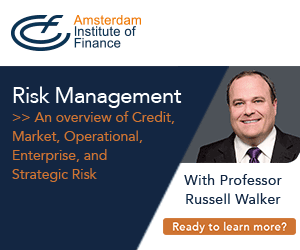The company or investor that can use data to evaluate and manage risk effectively is at an advantage. Risk management expert professor Russell Walker will teach the major points, working with applied examples, at the Amsterdam Institute of Finance.
Growing up in Florida, USA, Russell Walker was struck by an observation – there were no hurricanes, yet he knew from his grandfather’s stories that hurricanes had killed hundreds of people in decades gone by. “I was curious about that. How could something so dangerous be so variable? I wanted to find out.”
This interest guided his studies, from water resources and how and why storms occur, to statistics and economics, and ultimately to risk analysis and management in the world of banking and commerce, which is now his area of expertise. “Risk management is really at the core of what financial institutions do. The banking problem is not the hurricane problem, but they are mathematically identical. I’m trying to understand how something happens and why.”
The what and why questions are being answered more effectively now, thanks to big data, Russell’s other area of interest and expertise. He says, “In the recession, banks threw up their hands and said they didn’t know it was so bad. Because they didn’t use the data. Often, they simply made predictions on what they believed or wanted to believe. Basel III says you have to use the data, you have to stress-test the portfolio. What’s also happened is that banks are becoming more proactive in controlling their losses, actively deploying AI and machine learning to get early warning signs of deterioration in the economy.”
Risk management is a core competency. The company or investor that can evaluate and manage risk effectively is at an advantage, says Russell. “Your risk management philosophy is effectively your investment philosophy. As investors, we don’t know what impact Brexit, or the US trade war with China, will have on investment, for example. Emotionally, investors might fear it to be negative, and want to reduce their risk. And then there are those who can stomach the risk, and contrarian to the rest of the market, they might snap up assets. The building is burning but they’re walking in!”
Risk management transcends borders and current events. “Whether they are based in the UK, Japan, Europe or the US, banks are expected to follow the same procedures and methodology set out in Basel III. In spite of all the changes and uncertainty affecting business, there’s an element of trust in that that I find that really reassuring,” says Russell.
He will bring his enquiring mind and his broad expertise to the four-day Risk Management program at the Amsterdam Institute of Finance. The course gives an overview of the sources and causes of risk that businesses are exposed to, including credit risk, market risk, operational risk, enterprise risk, and strategic risk. The course content includes risk reporting mechanisms, and how to use metrics and data to prepare for and prevent losses.
“Few people go to college saying, ‘I’d like a career in risk management in the banking industry’, they are usually talented in a finance or accounting or some other skill. They don’t study risk management specifically. In this intensive program they can learn the major points and work with applied examples. For an executive who has a role in risk management and wants a broad perspective, it’s the right course.”
“Risk management is really about trying to understand the world.
Professor Russell Walker
He concludes, “Risk management is really about trying to understand the world. It’s sometimes seen as a rather stuffy old business, but it’s not at all. If you have a curious mind it’s intriguing. You are literally looking for something no one has found before. When we talk about case studies in this program we’re talking about organizations, and stories. It’s fun and fascinating to unravel those stories.”
Note: Russel Walker also teaches a two-day course on Operational Risk at the Amsterdam Institute of Finance.

